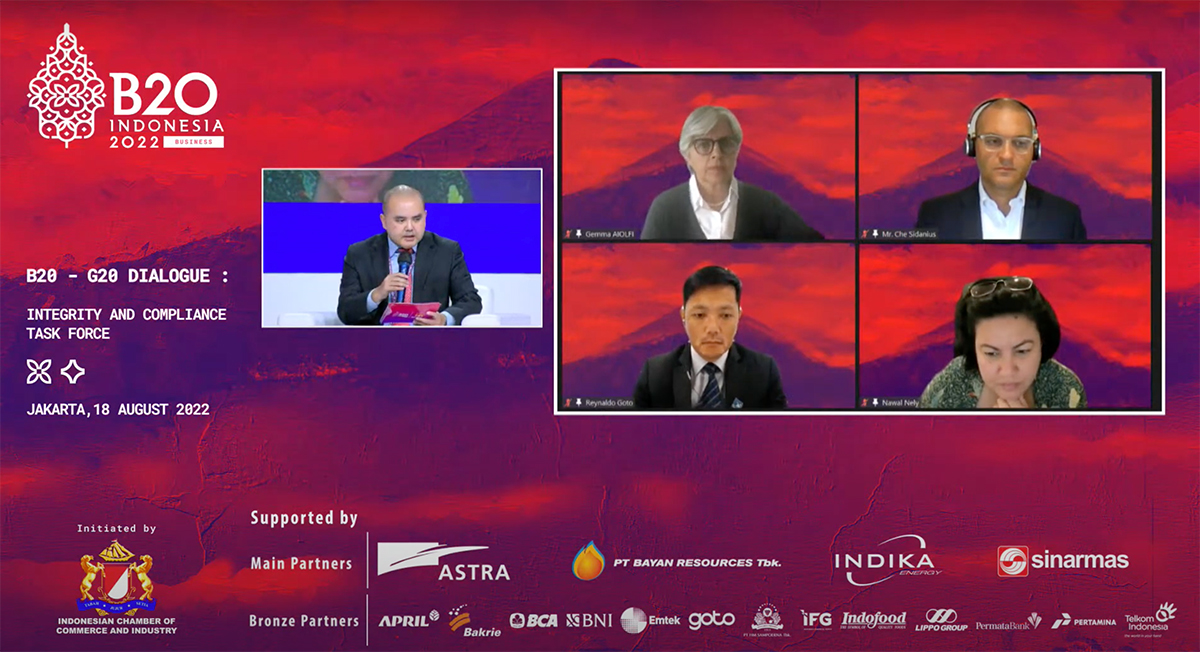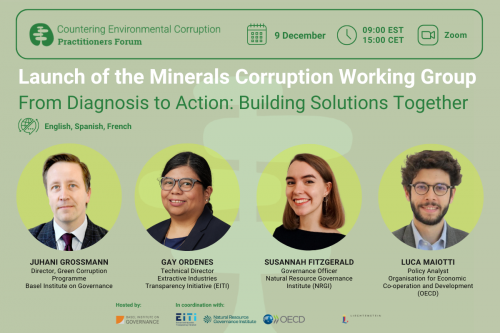Improving B20–G20 engagement – insights from the Indonesian B20–G20 dialogue on Integrity and Compliance

The B20-G20 dialogue has the potential to transform the way that both the B20 and G20 work towards a more streamlined and impactful process. But what does it take? And how do we get there?
Insights from Scarlet Wannenwetsch, who serves as Deputy Co-Chair of the B20 Indonesia Integrity and Compliance Taskforce. The Basel Institute on Governance has been honoured to support this year’s Taskforce as both Co-Chair and Network Partner. For those unfamiliar with the B20–G20 process on integrity and anti-corruption, you can learn more on the B20 and anti-corruption resource pages on the B20 Collective Action Hub.
The Indonesian presidency of the 2022 G20/B20 process is wrapping up, the policy papers are in their final drafts, and we are all gearing up for the B20 and G20 Summit marathon in November 2022.
And while it is too early to speculate on which of the integrity and anti-corruption recommendations of the B20 make their way into the G20 Leaders’ Declaration or the G20 Anti-corruption Working Group policy documents, we want to take this opportunity to spotlight an important platform that reflects the spirit of this process like no other: the B20–G20 dialogue.
Integrity: a topic that transcends borders and stakeholders
The difficulties faced by this year’s process, including the Covid-19 pandemic and the war in Ukraine, underscore the need to exchange, engage and work together more closely. Only in this way can we strive toward our common goals and values that are at the core of the G20-B20 community. This holds especially true for a topic that transcends borders, industry sectors and stakeholders in the way corruption does.
The need to bring together not only the B20 and G20 workstreams but at a more fundamental level its members and stakeholders to raise integrity and address common issues of corruption was also the resounding message at this year’s B20–G20 Integrity and Compliance dialogue on 18 August in Yogyakarta, Indonesia.
This is a message that has transcended the Integrity and Compliance Task Force and is being picked up by the leadership both at the B20 and G20 level. The Chair of the B20, Ms. Shinta Widjaja Kamdani (CEO of the Sintesa Group), called on all participants to:
“continue to push and leverage collaboration amongst business players and governments in the years to come.”
Rolliansyah Soemirat, Chair of G20 Indonesia Anti-corruption Working Group, echoed this sentiment when he underscored the:
“importance of having strong collaboration between all the sectors and stakeholders, namely business societies, youth, think tank communities and Ministries.”
This, he said, is the way to increase integrity and reduce corruption effectively.
A strong endorsement of anti-corruption Collective Action
We are pleased to see that fostering and promoting anti-corruption Collective Action for greater integrity is one of the core recommendations of this year’s B20 Integrity and Compliance policy paper.
The Integrity and Compliance Co-Chairs brought the recommendation to life during the dialogue. They shared examples and avenues for action to highlight the potential impact these kinds of Collective Action initiatives can have.
Learn more about these and the other B20/G20 anti-corruption priorities by watching the whole B20-G20 dialogue on YouTube.
Rotating presidency: strength or limitation?
So, it seems everyone is in agreement: We need stronger collaboration between the B20 and G20 workstreams to facilitate more multistakeholder and innovative approaches to strengthen integrity across stakeholder divides.
But how can we achieve this when each new G20/B20 presidency takes over the process and makes it their own?
A core strength of the G20 process is its flexibility and how it offers ownership of the process to each incoming presidency. This means it can respond to changes in the political landscape and pick up new topics as soon as they arise.
This flexibility does, however, come with certain limitations. One is the issue of continuity between cycles and the ability to streamline and build on previous discussions and established working relationships.
This perceived lack of continuity has led to periodic calls for the establishment of a permanent Secretariat or similar function, with little success to date. It could be said that the freedom for each country to define its own priorities and process overrides other considerations.
Leveraging the B20–G20 dialogue platform
How can we utilise and strengthen existing structures? A start could be to work more closely with consistently engaged stakeholders. This would help to leverage existing capacities and processes to bridge the gaps arising from the rotating presidency.
It is important to state here that although there is no permanent Secretariat, "soft” structures and processes have developed over time that provide continuity even when the presidency changes each year. These have already demonstrated their ability to stand the test of time, as they are voluntarily carried from one presidency to the next.
The B20–G20 dialogue is one such “soft” platform that has become a staple of each annual process since its inception. Before the establishment of the G20 Anti-corruption Working Group in 2010, for example, the B20–G20 dialogue was the main way for the B20 anti-corruption workstream to connect with the G20.
The B20–G20 dialogue has taken on many different formats, but over the last years has become an annual platform for the B20 and G20 workstreams to present and inform each other on focus topics and the outcome of their policy discussions. Typically, this exchange happens after the policy papers have been finalised, a month or two before the Summits.
This has not always been the chosen format. In 2013, for example, a G20–B20 Dialogue Efficiency Taskforce was set up, which assessed and rated the efficiency of previous B20 cycles and made recommendations on how the B20 can increase its impact at the G20 level. This setup led to active and consistent engagement between the B20 and G20 throughout this cycle, but has not since been replicated.
If both the G20 and B20 sides are committed to working together more closely, as we heard again during this year’s dialogue, the B20–G20 dialogue should be the obvious platform to leverage.
One dialogue is great, but two would be better
While it’s an important achievement that this type of exchange between the B20 and G20 workstreams has become institutionalised, it does beg the question whether the current set-up best serves the process.
Having only one dialogue per cycle doesn’t allow for constructive dialogue over time, or the identification of common areas of interest and potential for collaboration through each G20/B20 cycle. Under the current modus operandi, each B20–G20 dialogue is a one-off event for each presidency. The next cycle will bring together a different B20 Secretariat, a new G20 ACWG Chairperson, and new focus topics and recommendations to present and discuss.
This setup makes it difficult to build strong working relationships and facilitate ongoing exchange and alignment between the B20 and G20 anti-corruption workstreams.
Setting up a two-part B20–G20 dialogue for each cycle could be an easy way to strengthen and reinvigorate the dialogue. It would make it a more constructive and impactful engagement format without adding new bureaucratic structures.
Considering the timing of the dialogues can also be an effective tool to increase its potential impact. For example, a good time for the first dialogue could be between the first and second iterations of the draft policy papers. That gives both the G20 and B20 workstreams enough time to internally build consensus. It allows for a productive discussion between the workstreams in the early stages of the process, where alignment is still possible.
If the second dialogue remains in the same format and timing as currently, it can continue as an important exchange platform on the core policy recommendations that are being developed each year. But it would have the added benefit of being able to build and reflect on the first dialogue and outcomes as well.
This approach would allow both the G20 and B20 processes to identify areas for collaboration throughout the process and to assess engagement and alignment throughout each cycle.
How the OECD and other international organisations can help
International organisations that work and support both the G20 and B20 processes could take on more of an active role. They could help identify areas for collaboration and facilitate those discussions on an ongoing basis to help break down silos and bridge communication gaps.
The OECD has played a particularly important role in supporting the G20/B20 process since its inception. It has even been described as taking on some unofficial Secretariat duties within the G20/B20 process. This positions the OECD well to facilitate more impactful collaboration between the G20/B20 process.
Leveraging existing resources and knowledge
Each G20/B20 presidency has the opportunity to put its own stamp on their process. But it also has the opportunity to benefit and learn from work done in previous cycles.
For the Integrity and Compliance Taskforce, this includes B20-mandated resources such as the B20 Collective Action Hub. Developed and maintained by the Basel Institute on Governance, this free website offers resources and guidance for companies, governments and civil society interested in developing and engaging in anti-corruption Collective Action.
The B20 Collective Action Hub also provides a repository of all B20 Integrity and Compliance Taskforce documents since its inception, plus analysis on the uptake of recommendations and impact of the process.
In addition to existing resources, the consistently engaged members in the taskforces also have a lot of knowledge to bring to the table regarding what works and what doesn’t work so well.
In the context of the anti-corruption work of the B20, engaged taskforce members have set up regular meetings to discuss how to better engage and support the process. In 2021, this informal group published some of the key lessons learned over the last couple of years.
The way forward: Gradual improvements
We don’t have to reinvent the wheel or add new processes to make the G20/B20 process more impactful. Sometimes a coordinated effort of minor tweaks can also have significant results.
As we look from Indonesia to India, which will take over the presidency in 2023, we hope to see the core message from this year’s B20–G20 Integrity and Compliance dialogue – more collaboration and engagement between the G20 and B20 – translated into practice.
A final word of thanks to the Indonesian B20 Integrity and Compliance Taskforce leadership from Gemma Aiolfi, Head of Collective Action and Compliance, at the Basel Institute:
"The Basel Institute on Governance was honoured to serve as Network Partner and Co-Chair of this year's B20 Integrity and Compliance Taskforce. I want to give a special thanks to the Taskforce leadership for their dedication to a process that built on engaging the taskforce members to work together to co-develop actionable and impactful policy recommendations. We very much hope to see these translated into action in the near future."




